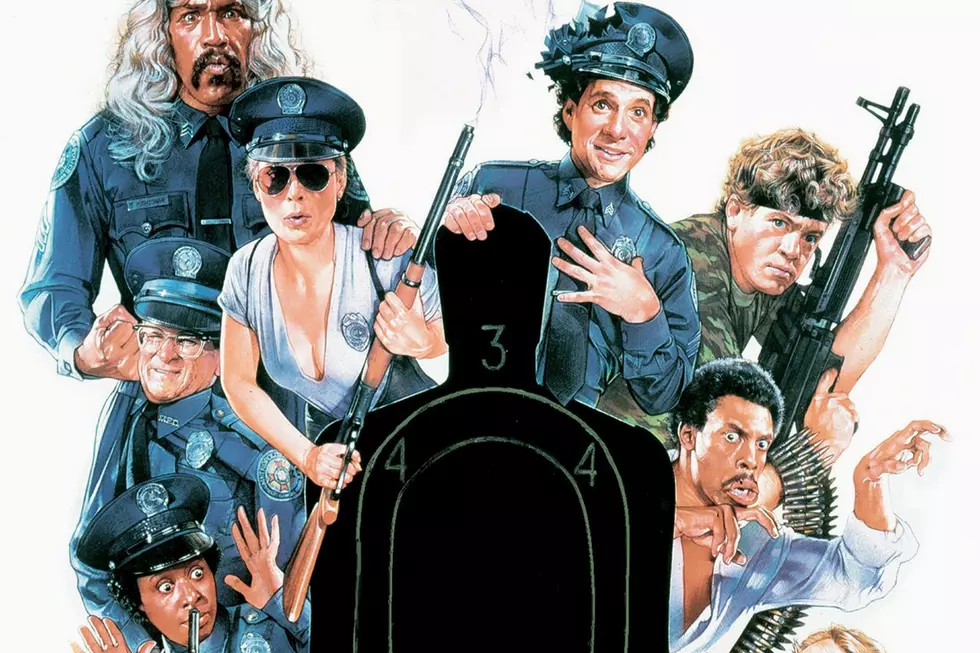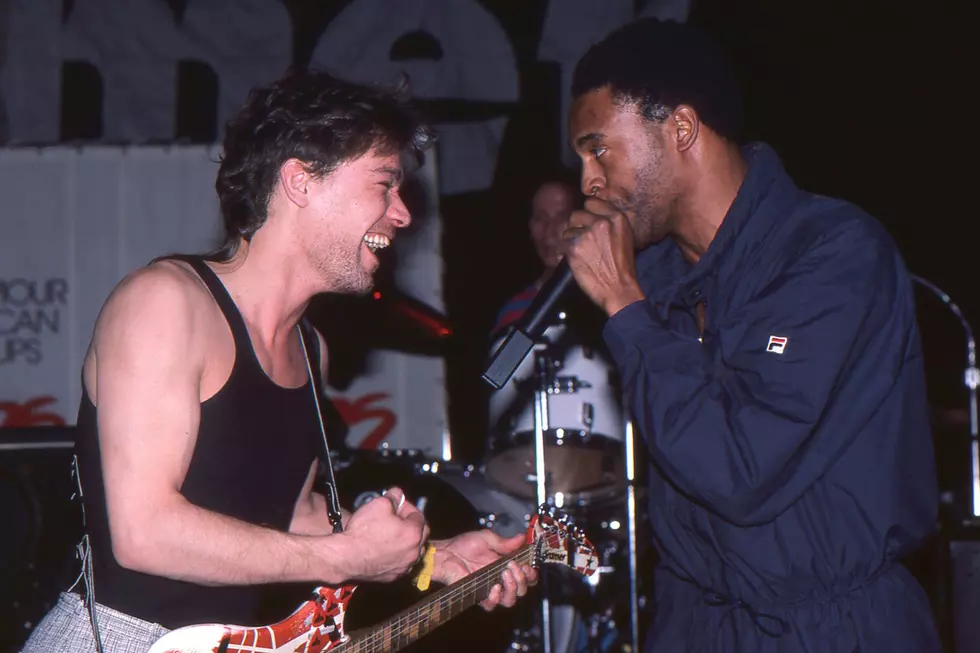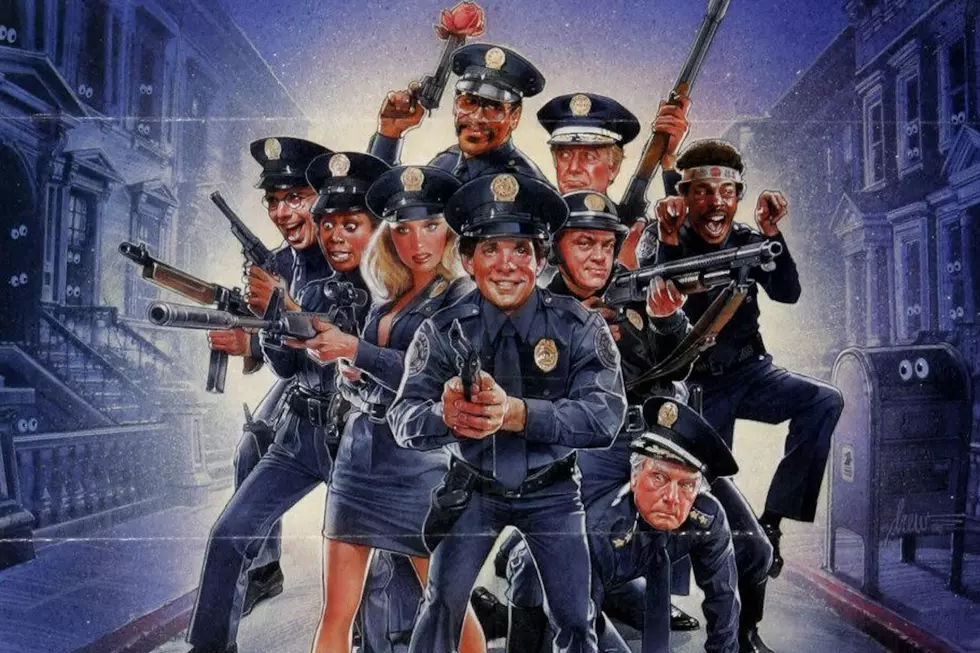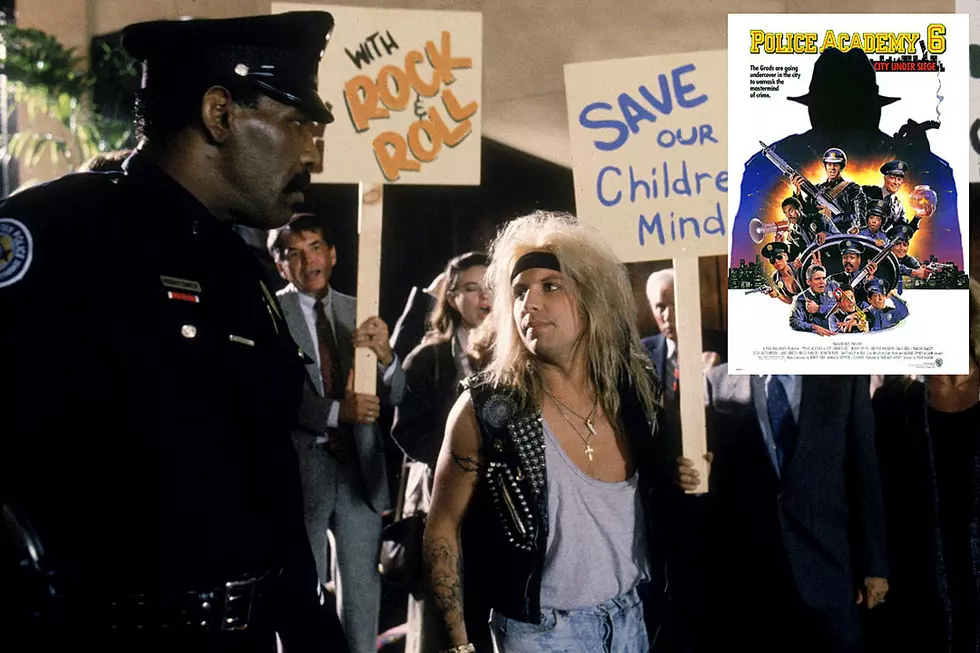
The Doom of a Franchise: ‘Police Academy: Mission to Moscow’
Most movie franchises go out with a whimper, not a bang. The characters grow stale and the plotlines become repetitive. And, most importantly, the world outside the theater changes. The things that are important to the audience – the things that scare them or make them laugh – evolve, and the franchise no longer speaks to people. Police Academy: Mission to Moscow, the seventh and final movie in the series from 1994, is one of the greatest examples of this.
The first Police Academy film was released in March 1984 and caused an immediate sensation. Made on a budget of $4.5 million, the movie grossed almost double that on its opening weekend alone and would go on to earn more than $160 million in the U.S. and abroad. Telling the story of a lovable band of rejects trying to learn how to be cops, the film propelled lead actor Steve Guttenberg into one of the most bankable stars in Hollywood and led to roles in hits like Cocoon, Short Circuit and Three Men and a Baby.
But in many ways, the heart of Police Academy wasn't Guttenberg's rakish deadbeat Carey Mahoney but the cast of supporting characters around him. There was Moses Hightower (ex-NFL player Bubba Smith), who was massive and incredibly strong and at the same time surprisingly gentle; Larvell Jones (Michael Winslow) who could mimic any sound in the world with his voice; Tackleberry (David Graf) who loved firearms of every sort since his mother gave him his first gun as a child; Commandant Lassard (George Gaynes), the empty-headed but benevolent man in charge of the Academy; and others.
Watch the Original 'Police Academy' Trailer
The template for bands of lovable losers like this one was laid down in the previous decade in movies like Animal House and Porky's; Police Academy would parlay the formula into an immensely profitable franchise. Every spring for the next half-decade saw the release of a new Police Academy film, leading up to Police Academy 6: City Under Siege in March 1989. Some actors hung around for a while – Guttenberg made it through the first four movies – while others, like Winslow, Graf and Gaynes, stayed on board for the entire run. And new faces, like Bobcat Goldthwait, popped up occasionally, appearing in a few outings and then disappearing again.
Although none of these movies were great, or even very good, the characters were familiar and fun, and the fans continued to go to the theaters. But each film earned less than the previous one, until City Under Siege grossed only $23 million against a $15 million budget. The steam was slowly going out of the franchise.
Watch the 'Police Academy 6' Trailer
But where there is intellectual property, there is always someone in Hollywood dreaming of making a killing. In the early '90s, producer Paul Maslansky, who had developed the original idea and spearheaded the franchise, decided to try for one more shot at the brass ring. He brought back all the actors willing to do another sequel, hired director Alan Metter, best known for the 1986 Rodney Dangerfield vehicle Back to School, and headed to Moscow to film.
The idea was clearly to capitalize on what was expected to be a new spirit of Russia-U.S relations following the fall of the Berlin Wall in 1989 and the liberalization of Russian after the end of the Cold War in 1991. Movies like 1988's Red Heat (in which Arnold Schwarzenegger played a Russian cop who comes to the States in pursuit of a criminal) and 1990's The Russia House (in which Sean Connery plays a British publisher who gets caught up in spy intrigue in Moscow) had already begun to explore this impending cultural interchange. In the wake of this, Mission to Moscow seemed like a natural gamble to take, approaching the material from a comedic angle. Regrettably, it proved to be a losing bet.
Police Academy: Mission to Moscow revolves around a plot by a Russian mafioso named Constantine Konali (Ron Perlman), who has developed a devious video game. Not only incredibly addictive, it also let Konali infiltrate the computer systems of anyone who plays it, allowing him to pull off several high-profile robberies.
Stumped, the Russians ask for American help and get the misfits from the Police Academy. The gang now consists of the old hands – Sgts. Jones and Tackleberry, Lassard, Capt. Callahan (Leslie Easterbrook) and Capt. Harris (G. W. Bailey) – along with a new recruit named Cadet Connors (Charlie Schlatter).
They get up to their old shenanigans, meet some likable Russians (it's the first feature film for Claire Forlani, who plays a Russian cop) and eventually defeat Konali, preventing him from using a new version of his game to overthrow all the world powers.
From the beginning, everything went poorly. The shoot was a difficult one, marred by continuing violence in Russia, which was still going through the aftereffects of the fall of the communist government. "It’s all quiet now," Maslansky told the Los Angeles Times in a telephone interview he conducted from his hotel room in Moscow during the shoot, "except you can hear some sporadic firing not too far from here, and you can see occasional tracer bullets through the window."
On top of this, perhaps sensing the project was a bit out of date, Warner Bros. didn't plan on giving the film a theatrical release, despite its $10 million budget. In the same Times interview, Maslansky noted that he hoped once the execs saw the finished product, they would change their minds and put it in theaters instead of sending it straight to video. They didn't. The film arrived on Aug. 26, 1994, and went on to earn an almost unimaginably small sum of $126,247, putting the final stake through the heart of the franchise.
The reasons for this failure have to do with what appears onscreen: The plot doesn't work particularly well, the gags are stale and the actors have the distinct air of being in it only for the paycheck. And maybe the audience had forgotten about the Police Academy; it had been five years since the previous movie, and people had been turning away from the franchise even then.
But the most apparent flaw in Mission to Moscow is how completely out of step with its times it is. By the early '90s, comedy filmmaking had moved almost entirely away from the broad, silly world of the Police Academy films. The bigger-budget market was dominated by movies like Wayne's World (1992), a Saturday Night Live spin-off that was cutting and referential instead of being centered on goofy, locker-room humor.
And the more cutting-edge Hollywood comedic sensibility was being defined by things like Singles (1992) and Dazed and Confused (1993), films that played on Gen-X cynicism and rejection of bland '80s conformity. On top of this, a new generation of ultra-hip and visually stylized films – from the indie swagger of Swingers (1996) to the absurdist theatrics of The Big Lebowski (1998) to the twee confection of Rushmore (1998) – was on the horizon. In comparison to this fresh wave of comedies, Mission to Moscow feels like a regrettable museum piece, already an entire generation out of date by the time it was released.
Watch the 'Police Academy: Mission to Moscow' Trailer
In the end, despite Mission to Moscow's reputation as being an epically bad film, it wasn't a quality control problem that doomed the franchise. Instead, it was changes in the culture itself.
In 1984, young people were happy to laugh at a band of raunchy police recruits getting into trouble. Ten years later, the world was a different place. The Reagan moment was dead, and cynicism, irony and in-movie references were in the air. The future seemed if not dismal then at least uncertain. And the Police Academy franchise simply wasn't equipped to deal with that.
25 '80s Movie Sequels That Shouldn't Have Been Made
More From Ultimate Classic Rock









